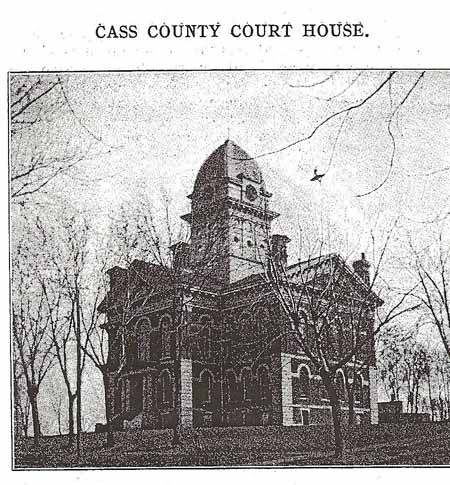
CASS COUNTY
The earliest settlers were from the Mormon colony of Nauvoo, Illinois, who broke off from the contingent Brigham YOUNG led to Utah, and coming back from the Missouri River in 1847-48, located near Lewis. In 1847 the first postoffice in the county was established at what was known as Indian Town, and the government called it Cold Springs. The mail came once a week from what is now known as Council Bluffs. The first voting in the county was done in 1849. From this period the growth was slow but constant, and soon settlers' cabins dotted the prairies in all directions. The first school in the county was taught in 1852-3. The first term of court was held at Lewis, the then county seat, in 1854. The first wedding took place in June, 1853. The first white child was born in September, 1852. The first death of a white person occurred in 1850. The county was established within its present boundaries in 1851, and was named after Lewis Cass, then Senator from Michigan. It was organized on the first Monday in April, 1853, to elect county and township officers. In those days the state controlled the sale of liquor and Jeremiah BRADSHAW was appointed agent fro the sale of liquor in October, 1855. The county seat was removed from Lewis to Atlantic in 1869. The first census was taken in 1856 and there were 815 persons in the county -- males, 448, females, 367. In that year only 172 tons of hay were grown in the county, 322 bushels of oats, 2,838 bushels of spring wheat, 348 bushels of winter wheat , 40,013 bushels of corn; 310 hogs were sold for $1, 684 , and 317 cattle for $10,304. The value of domestic manufactories was $350, and of general manufactories $4,150. There were 2,130 marriages during the first thirty years of the county's history. The present court house was ordered built at the election in 1880, the vote being 1,997 for and 1,484 against the proposition to bond. The first church, the Congregational, at Lewis, was organized in 1855. The first newspaper in Cass County was the Cass County Gazette, established at Lewis in January, 1861. H.C. JOHNSON of Atlantic established the Cass County Messenger at Lewis in 1864. The Telegraph, with Lafe YOUNG as owner and editor, was established in Atlantic in 1971. He named Atlantic "The Magic City." The Atlantic Daily Telegraph came in 1879. The Cass County Democrat, the successor of the Anita Times, established by Charles F. CHASE in 1877, was the first published in Atlantic August 11, 1880. The Daily Democrat was first printed April 1, 1903. D.M. HARRIS, now of Missouri Valley, published the Cap Sheaf in Atlantic in 1874-75. The Lewis Independent was established in May, 1880, by J.B. ERION, and was changed to the Standard later and is now the property of G.W.B. FLETCHER. The Marne Message, now the Marne Free Press , was established in July, 1882, by O.C. BATES. The Anita Tribune was established by Sherm F. MEYERS in December, 1883. The Griswold Advocate was established in February, 1880, by RAGSDALE & SCOTT. The Gleaner was established in 1903 by D.H. SCOTT. The Anita Republican, Cumberland Express and Messena Echo came later. There was but one school house in the county in 1858. Today there are 142. James W. BROWN was the first superintendent of schools. The Rock Island road came to Cass County in 1868. But this is retrospective and printed in order to show the wonderful growth a half century has wrought.
Cass County's population, according to the 1900 census, was 21,274, and is now more than 22,000. From a wilderness of raw prairie it has developed into a garden spot , with every foot of tillable land under the plow or in meadow or pasture. There are thousands of cattle on its hills and in its valleys, and modern farm dwelling, with telephone connection with neighboring farmers and all the towns in the county, have taken the place of the log cabin and the "shack." Churches are everywhere and are well attended and the ministers well provided for. School houses are two miles apart in the county and are provided with a corps of teachers unexcelled anywhere, while in the towns and cities the best is none too good and the school tax is the only one over which there is no kick. The old wooden bridges have been superceded by iron and steel and the temporary period has gone never to return. Its towns are growing and prosperous and its business men energetic and abreast with the procession. Everywhere are evidences of thrift and prosperity and its people are intelligent, industrious, economical, prosperous and happy. Farm lands have increased in value until good improved farms sell fro from $65 to $100 per acre. The tax rate is reasonable and no county in the state presents more inducements for the man with means looking for an ideal place to live.Cass County shines resplendent in the tiara of counties which graces the brow of Matchless Iowa.
From: Exposition Souvenir Album, published by Democrat Publishing Company, Atlantic, Iowa, 1904. Transcribed by Brenda Magee, March, 2010.
Copyright © 1996
The IAGenWeb Project
IAGenWeb Terms, Conditions
& Disclaimer

